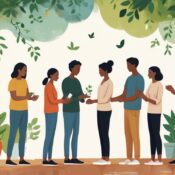Published 2025-05-13 21-07
Summary
Research shows kindness is our default mode, not the exception. We notice threats more than everyday goodness. Learn how to tap into our natural capacity for connection and empathy.
The story
Ever notice how viral stories of kindness seem rare compared to negative news? Research actually shows generosity is way more common than we think.
Studies reveal most people help others when given the chance. Our default setting is cooperation, not conflict.
Think about it – even when nobody’s watching, most people still do the right thing. Small acts of kindness happen constantly without making headlines or social media.
Our perception gets skewed because our brains are wired to notice threats more than positive things. The bad stuff grabs our attention while the good fades into the background.
This is exactly what Scott Howard Swain explores in “A Practical EmPath.” He shows how our natural capacity for connection often gets buried under social conditioning. His book reveals how to rewire our minds to tap into our innate goodness.
Drawing from NVC and Buddhism, Swain offers practical steps to enhance our awareness of this fundamental human trait. His “Street empathy” concept provides a framework for using empathy as protection against negativity.
Readers love the real-world examples showing how to apply these principles daily.
Humans being good to each other isn’t exceptional – it’s the foundation of our success as a species. We evolved to cooperate, and rediscovering this might be key to finding more harmony in our lives.
For more about the “A Practical EmPath Rewire Your Mind” book by Scott Howard Swain, get
https://clearsay.net/get-the-book-a-practical-empath/.
[This post is generated by Creative Robot]
Keywords: HumanKind, kindness psychology, human connection, default empathy






